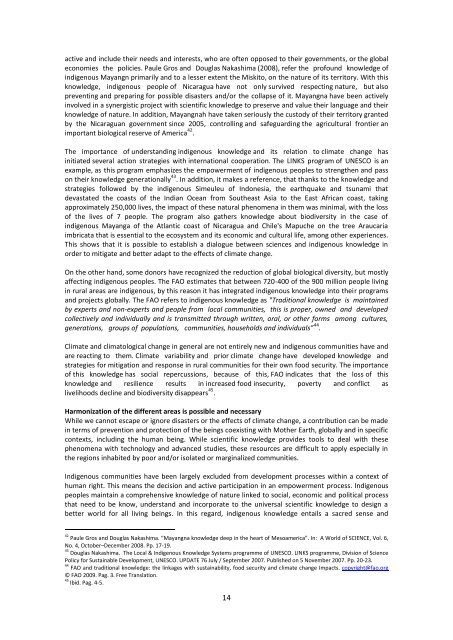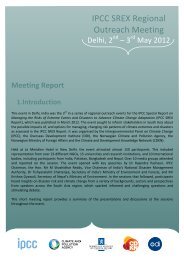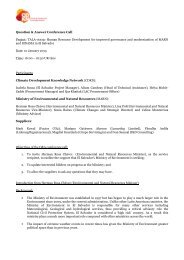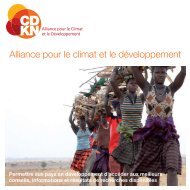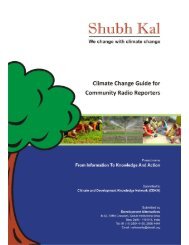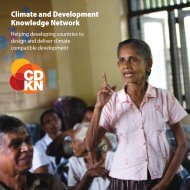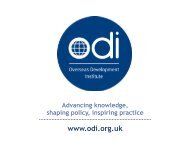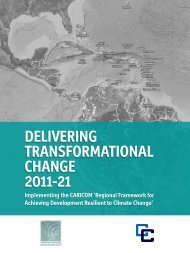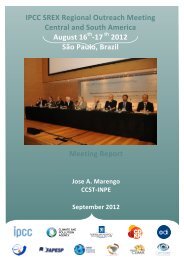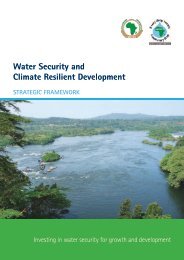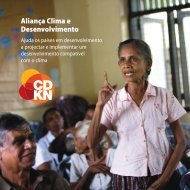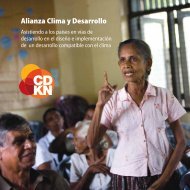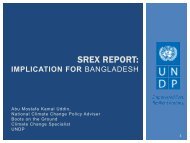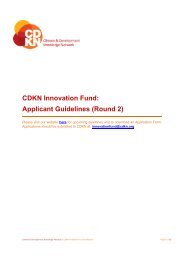Harmonized Perspectives - CDKN Global
Harmonized Perspectives - CDKN Global
Harmonized Perspectives - CDKN Global
- No tags were found...
Create successful ePaper yourself
Turn your PDF publications into a flip-book with our unique Google optimized e-Paper software.
active and include their needs and interests, who are often opposed to their governments, or the globaleconomies the policies. Paule Gros and Douglas Nakashima (2008), refer the profound knowledge ofindigenous Mayangn primarily and to a lesser extent the Miskito, on the nature of its territory. With thisknowledge, indigenous people of Nicaragua have not only survived respecting nature, but alsopreventing and preparing for possible disasters and/or the collapse of it. Mayangna have been activelyinvolved in a synergistic project with scientific knowledge to preserve and value their language and theirknowledge of nature. In addition, Mayangnah have taken seriously the custody of their territory grantedby the Nicaraguan government since 2005, controlling and safeguarding the agricultural frontier animportant biological reserve of America 42 .The importance of understanding indigenous knowledge and its relation to climate change hasinitiated several action strategies with international cooperation. The LINKS program of UNESCO is anexample, as this program emphasizes the empowerment of indigenous peoples to strengthen and passon their knowledge generationally 43 . In addition, it makes a reference, that thanks to the knowledge andstrategies followed by the indigenous Simeuleu of Indonesia, the earthquake and tsunami thatdevastated the coasts of the Indian Ocean from Southeast Asia to the East African coast, takingapproximately 250,000 lives, the impact of these natural phenomena in them was minimal, with the lossof the lives of 7 people. The program also gathers knowledge about biodiversity in the case ofindigenous Mayanga of the Atlantic coast of Nicaragua and Chile's Mapuche on the tree Araucariaimbricata that is essential to the ecosystem and its economic and cultural life, among other experiences.This shows that it is possible to establish a dialogue between sciences and indigenous knowledge inorder to mitigate and better adapt to the effects of climate change.On the other hand, some donors have recognized the reduction of global biological diversity, but mostlyaffecting indigenous peoples. The FAO estimates that between 720-400 of the 900 million people livingin rural areas are indigenous, by this reason it has integrated indigenous knowledge into their programsand projects globally. The FAO refers to indigenous knowledge as "Traditional knowledge is maintainedby experts and non-experts and people from local communities, this is proper, owned and developedcollectively and individually and is transmitted through written, oral, or other forms among cultures,generations, groups of populations, communities, households and individuals” 44 .Climate and climatological change in general are not entirely new and indigenous communities have andare reacting to them. Climate variability and prior climate change have developed knowledge andstrategies for mitigation and response in rural communities for their own food security. The importanceof this knowledge has social repercussions, because of this, FAO indicates that the loss of thisknowledge and resilience results in increased food insecurity, poverty and conflict aslivelihoods decline and biodiversity disappears 45 .Harmonization of the different areas is possible and necessaryWhile we cannot escape or ignore disasters or the effects of climate change, a contribution can be madein terms of prevention and protection of the beings coexisting with Mother Earth, globally and in specificcontexts, including the human being. While scientific knowledge provides tools to deal with thesephenomena with technology and advanced studies, these resources are difficult to apply especially inthe regions inhabited by poor and/or isolated or marginalized communities.Indigenous communities have been largely excluded from development processes within a context ofhuman right. This means the decision and active participation in an empowerment process. Indigenouspeoples maintain a comprehensive knowledge of nature linked to social, economic and political processthat need to be know, understand and incorporate to the universal scientific knowledge to design abetter world for all living beings. In this regard, indigenous knowledge entails a sacred sense and42 Paule Gros and Douglas Nakashima. “Mayangna knowledge deep in the heart of Mesoamerica”. In: A World of SCIENCE, Vol. 6,No. 4, October–December 2008. Pp. 17-19.43 Douglas Nakashima. The Local & Indigenous Knowledge Systems programme of UNESCO. LINKS programme, Division of SciencePolicy for Sustainable Development, UNESCO. UPDATE 76 July / September 2007. Published on 5 November 2007. Pp. 20-23.44 FAO and traditional knowledge: the linkages with sustainability, food security and climate change Impacts. copyright@fao.org© FAO 2009. Pag. 3. Free Translation.45 Ibid. Pag. 4-5.14


